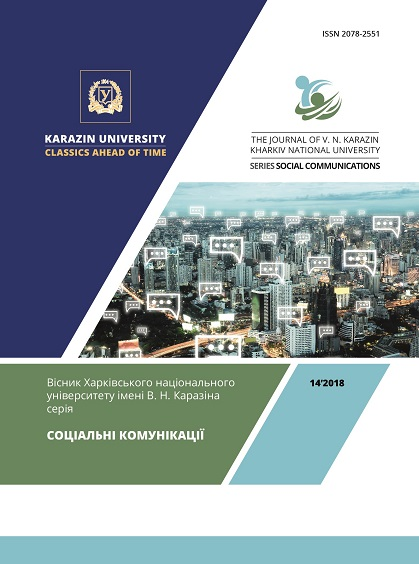Quantitative evaluation of the potential impact of Google search results on the public person reputation
Abstract
The paper provides our methodology for the quantitative evaluation of the possible impact that search results have on the reputation of public persons. Using this technique will allow media analysts, PR specialists and press officers describe quantitatively the quality and acceptability of search results for their customers, to formulate a strategy for improving such results by using media communication and SEO optimization of their pages. We showcase the application of the methodology by investigating search results for the name of the director of the National Anti-Corruption Bureau Artem Sytnik. Doing this, we became able to discover such features of the formation of his image as a weak potential impact of publications with openly negative tonality on the politician`s image; the high potential impact of publications with the explicit position of Artem Sytnik; lack of personal information, which leads to a one-sided image, its focus only on professional activities, without taking into account such important factors of a reputation as humanity, patriotism, and progressiveness; the high variability of the search results about Artem Sytnik, and then, the ability to adjust the results easily.
Downloads
References
Epstein R. The search engine manipulation effect (seme) and its possible impact on the outcomes of elections / R. Epstein, R. E. Robertson // Proceedings of the National Academy of Sciences of the United States of America. – 2015. – Vol. 112, No. 33. – P. E4512–E4521.
DuckDuckGo Blog, Measuring the filter bubble: how google is influencing what you click [Electronic source] / DuckDuckGo Blog. – 2018. – URL: https://spreadprivacy.com/google-filter-bubble-study/ (Accessed 02.09.2019).
Factum Group Ukraine, Opinion software media: panel for april 2019 [Electronic source]/ Factum Group Ukraine. – 2019. – URL: https://inau.ua/sites/default/files/file/1905/presentation_osm_april_2019.pdf (Accessed 02.09.2019).
Deephouse D. L. Media reputation as a strategic resource: an integration of mass communication and resource-based theories / D. L. Deephouse // Journal of Management. – 2000. – Vol. 26, No. 6. – P. 1091–1112.
Zhang X. Measuring media reputation: a test of the construct validity and predictive power of seven measures / X. Zhang // Journalism and Mass Communication Quarterly. – 2016. – Vol. 93, No. 4. – P. 884–905.
Trevisan F. The google voter: search engines and elections in the new media ecology / F. Trevisan, A. Hoskins, S. Oates, D. Mahlouly // Information Communication and Society. – 2018. – Vol. 21, No. 1. – P. 111–128.
Haim M. Burst of the filter bubble?: effects of personalization on the diversity of google news / M. Haim, A. Graefe, H. B. Brosius // Digital Journalism. – 2018. – Vol. 6, No. 3. – P. 330–343.
Zakharchenko A. Principles of information campaigns’ quantitative analysis / A. Zakharchenko // Information Society. – 2017. – No. 26. – P. 19–30.
Reputation Institute, RepTrak [Electronic source] / Reputation Institute. – 2019. – URL: https://www.reputationinstitute.com/solutions (Accessed 02.09.2019).




